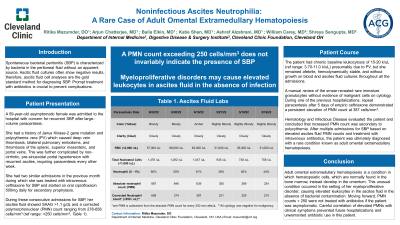Tuesday Poster Session
Category: Liver
P3999 - Noninfectious Ascites Neutrophilia: A Rare Case of Adult Omental Extramedullary Hematopoiesis
Tuesday, October 24, 2023
10:30 AM - 4:00 PM PT
Location: Exhibit Hall

Has Audio
- SS
Shreya Sengupta, MD
Cleveland Clinic Foundation
Cleveland, Ohio
Presenting Author(s)
Ritika Mazumder, DO, Arjun Chatterjee, MD, Katie Shen, MD, Ashraf Alzahrani, MD, Shreya Sengupta, MD, William Carey, MD
Cleveland Clinic Foundation, Cleveland, OH
Introduction: Spontaneous bacterial peritonitis (SBP) is characterized by bacteria in the peritoneal fluid without an apparent source. Prompt treatment with antibiotics is crucial to prevent complications.
Case Description/Methods: A 59-year-old asymptomatic female was admitted to the hospital with concern for recurrent SBP after large-volume paracentesis. She had a history of Janus Kinase-2 gene mutation and polycythemia vera (PV) which caused deep vein thrombosis, bilateral pulmonary embolisms, and thrombosis of the splenic, superior mesenteric, and portal veins. This was further complicated by non-cirrhotic, pre-sinusoidal portal hypertension with recurrent ascites, requiring paracentesis every other week. She had two similar admissions in the previous month where she was treated with intravenous ceftriaxone for SBP and started on oral ciprofloxacin 500mg daily for secondary prophylaxis. During these consecutive admissions for SBP, her ascites fluid showed SAAG >1.1 g/dL and a corrected polymorphonuclear (PMN) count ranging from 278-658 cells/mm3 (ref range: < 250 cells/mm3, Table 1). The patient had chronic baseline leukocytosis of 15-20 k/uL (ref range: 3.70-11.0 k/uL) presumably due to PV, but she remained afebrile, hemodynamically stable, and without growth on blood and ascites fluid cultures throughout all the admissions. A manual review of the smear revealed rare immature granulocytes without evidence of malignant cells on cytology. During one of the previous hospitalizations, repeat paracentesis after 5 days of empiric ceftriaxone demonstrated a persistent elevation of PMN count at 387 cells/mm3. Hematology and Infectious Disease evaluated the patient and concluded that increased PMN count was secondary to polycythemia. After multiple admissions for SBP based on elevated ascites fluid PMN counts and treatment with intravenous antibiotics, the patient was ultimately diagnosed with a rare condition known as adult omental extramedullary hematopoiesis. In this condition, hematopoietic cells, which are normally found in the bone marrow, instead develop in the omentum.
Discussion: This unusual condition occurred in the setting of her myeloproliferative disorder, causing elevated leukocytes in the ascites fluid in the absence of bacterial contamination. Moving forward, PMN counts > 250 were not treated with antibiotics if the patient was asymptomatic. Careful correlation of elevated PMNs with clinical symptoms prevented future hospitalizations and unwarranted antibiotic use in this patient.
Disclosures:
Ritika Mazumder, DO, Arjun Chatterjee, MD, Katie Shen, MD, Ashraf Alzahrani, MD, Shreya Sengupta, MD, William Carey, MD. P3999 - Noninfectious Ascites Neutrophilia: A Rare Case of Adult Omental Extramedullary Hematopoiesis, ACG 2023 Annual Scientific Meeting Abstracts. Vancouver, BC, Canada: American College of Gastroenterology.
Cleveland Clinic Foundation, Cleveland, OH
Introduction: Spontaneous bacterial peritonitis (SBP) is characterized by bacteria in the peritoneal fluid without an apparent source. Prompt treatment with antibiotics is crucial to prevent complications.
Case Description/Methods: A 59-year-old asymptomatic female was admitted to the hospital with concern for recurrent SBP after large-volume paracentesis. She had a history of Janus Kinase-2 gene mutation and polycythemia vera (PV) which caused deep vein thrombosis, bilateral pulmonary embolisms, and thrombosis of the splenic, superior mesenteric, and portal veins. This was further complicated by non-cirrhotic, pre-sinusoidal portal hypertension with recurrent ascites, requiring paracentesis every other week. She had two similar admissions in the previous month where she was treated with intravenous ceftriaxone for SBP and started on oral ciprofloxacin 500mg daily for secondary prophylaxis. During these consecutive admissions for SBP, her ascites fluid showed SAAG >1.1 g/dL and a corrected polymorphonuclear (PMN) count ranging from 278-658 cells/mm3 (ref range: < 250 cells/mm3, Table 1). The patient had chronic baseline leukocytosis of 15-20 k/uL (ref range: 3.70-11.0 k/uL) presumably due to PV, but she remained afebrile, hemodynamically stable, and without growth on blood and ascites fluid cultures throughout all the admissions. A manual review of the smear revealed rare immature granulocytes without evidence of malignant cells on cytology. During one of the previous hospitalizations, repeat paracentesis after 5 days of empiric ceftriaxone demonstrated a persistent elevation of PMN count at 387 cells/mm3. Hematology and Infectious Disease evaluated the patient and concluded that increased PMN count was secondary to polycythemia. After multiple admissions for SBP based on elevated ascites fluid PMN counts and treatment with intravenous antibiotics, the patient was ultimately diagnosed with a rare condition known as adult omental extramedullary hematopoiesis. In this condition, hematopoietic cells, which are normally found in the bone marrow, instead develop in the omentum.
Discussion: This unusual condition occurred in the setting of her myeloproliferative disorder, causing elevated leukocytes in the ascites fluid in the absence of bacterial contamination. Moving forward, PMN counts > 250 were not treated with antibiotics if the patient was asymptomatic. Careful correlation of elevated PMNs with clinical symptoms prevented future hospitalizations and unwarranted antibiotic use in this patient.
Disclosures:
Ritika Mazumder indicated no relevant financial relationships.
Arjun Chatterjee indicated no relevant financial relationships.
Katie Shen indicated no relevant financial relationships.
Ashraf Alzahrani indicated no relevant financial relationships.
Shreya Sengupta indicated no relevant financial relationships.
William Carey indicated no relevant financial relationships.
Ritika Mazumder, DO, Arjun Chatterjee, MD, Katie Shen, MD, Ashraf Alzahrani, MD, Shreya Sengupta, MD, William Carey, MD. P3999 - Noninfectious Ascites Neutrophilia: A Rare Case of Adult Omental Extramedullary Hematopoiesis, ACG 2023 Annual Scientific Meeting Abstracts. Vancouver, BC, Canada: American College of Gastroenterology.
